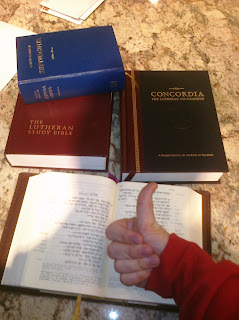
I've now completed week 1 of my (in my humble opinion) groundbreaking and original Bible reading plan. Basically, this one follows the church year, reads the Pentateuch, Gospels, Acts, Psalms, every year, and the rest every 3 years, including time for reading the Lutheran Confessions. I have a detailed explanation on Resurrection's website (the church I'm serving at as a student pastor for this school year).
It's going fantastic so far. Manageable, a good variety, interesting.
In a purposely overly-simplistic way for the sake of expressing it in this blog post, if I can comfortably read though these books, then I'll have the essential base for understanding all of biblical studies, which involves in-depth knowledge of literature, history, and philosophy/theology.
These are the four books:
1) Greek and Hebrew Bible (or if you prefer, Biblia Sacra Utriusque Testamenti Editio Hebraica et Graeca). It's a single volume which contains the 27th Nestle-Aland Greek Bible and the 4th edition BHS Hebrew Bible. It doesn't get more hardcore than this. I even got a leather-cover custom made for this baby.
2) The Rahlfs-Hanhart Septuagint, 2nd edition. The Septuagint is a hard to define term, but basically it can refer to the Greek translations of the Hebrew Bible. Now, I know this isn't the critical apparatus isn't much by any means compared to Göttingen Septuagint, but my interest for the present isn't the implications or interpretations of all the Greek variants, but instead comprehending and immersing myself in the language of the Koine Septuagint itself so I can better understand the "Intertestamental Time" and the language of the Greek Bible.
3) The Lutheran Study Bible. For more in depth information, go here http://www.cph.org/t-tlsb.aspx. This is an exceptional study Bible which has excellent scholarship behind it, and it's uniquely devotional and meditational with Law and Gospel applications (including Luther's Small Catechism!), which is befitting anything Lutheran as opposed to a standard Evangelical study Bible focused more on apologetics or a certain theme.
4) The Book of Concord. This is the least important of the three, but good for understanding one aspect of Church History in a cursory way, and good for seeing how pious laymen and theologians down the ages who knew their Bibles have expressed their belief in the Word they were willing to die for (and many did). This edition has great footnotes and introductions. Perhaps next year I'll get to reading just one of the Latin and German editions I own (forget the Triglotta with the English besides! :) ). For more info on these epic statements of faith, see http://www.cph.org/t-topic-concordia-faq.aspx
So since high-school I've been reading through the Bible every year in one form or another. This is my first time mixing it up a bit more. Feel free to contact me for advice on a plan that'd fit you. I've tried many and have a lot of creative ideas for other plans as well.
I can't overstate how it's changed my life to read the Bible regularly and annually. There are tons of different types of reading plans. So if you have interest, check one out and go for it. New Years is a good time to start! If you want a boost, here's a few sites with some plans.
No comments:
Post a Comment